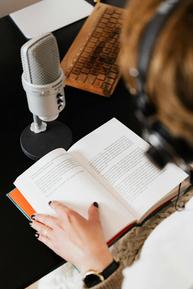"Is This the Most Boring Man In the World?" Last month, the Wall Street Journal posed the question in a headline for a piece on the popularity of soothing and somnolent recorded voices as sleep aids.
 Eventually the article turned to audiobook narrators, even citing a decision by executives at an international corporate monolith's subsidiary (hint: rhymes with oddible). Apparently the suits had noticed that many of their customers were listening to audiobooks with a sleep timer, which led to the launch of something called the Sleep Collection, featuring "bedtime tales read by stars including Brian Cox, Eva Longoria and Keke Palmer.... But for dozing off, many listeners find audiobooks originally intended to entertain do the trick just fine," the Journal wrote.
Eventually the article turned to audiobook narrators, even citing a decision by executives at an international corporate monolith's subsidiary (hint: rhymes with oddible). Apparently the suits had noticed that many of their customers were listening to audiobooks with a sleep timer, which led to the launch of something called the Sleep Collection, featuring "bedtime tales read by stars including Brian Cox, Eva Longoria and Keke Palmer.... But for dozing off, many listeners find audiobooks originally intended to entertain do the trick just fine," the Journal wrote.
One woman interviewed for the piece recommended audiobooks narrated by the legendary actor and author Stephen Fry, saying: "The British timbre of Fry's voice is modulated, plummy, yet silvery; a perfect concoction for a peaceful night's sleep." This, of course, is just blatantly sacrilegious, especially in the lead-up to Audiobook Month.
As a longtime audiobook reader, I'd never really considered the possibility of the format being employed as an aural sleeping pill. Not that I haven’t dozed off occasionally while listening late at night, but I consider that failure on my part rather than a sleeping success story. And the bookseller in me would instinctively respond to the audio-dozers by saying they're just listening to the wrong audiobooks.
 In any case, the audiobook market is thriving despite them, so somebody's staying awake.
In any case, the audiobook market is thriving despite them, so somebody's staying awake.
The Audio Publishers Association recently reported in its annual survey that audiobook sales rose 9%, to $2 billion in 2023, continuing the category's steady growth over the years, and a majority of adults in the U.S. (52%) have listened to an audiobook.
Surveyed in February, some 38% of American adults listened to an audiobook, up from the 35% reported a year earlier. And the most avid audiobook fans listened to an average of 6.8, up from 6.3 a year earlier. Overall, all audiobook listeners listened on average to 4.8 audiobooks, up from four the previous year.
In Canada, a report on leisure time and reading habits by BookNet Canada found that while the majority of readers prefer to read print books (59%), followed by e-books (20%), and audiobooks (13%), the dominance of print preference has been dropping since 2019 (from 65% to 59% in 2023), while at the same time, preference for audiobooks has been rising (from 8% in 2019 to 13% in 2023). In addition, Canadian readers’ interest in abridged audiobooks, with sound effects and/or music, and environmentally friendly print books is on the rise.
![]() This year Libro.fm is celebrating its 10th anniversary as a welcome Amazon/Audible antidote for independent booksellers. Its first six partner bookshops were Village Books, Bellingham, Wash.; Octavia Books, New Orleans, La.; Green Apple Books, San Francisco, Calif.; Third Place Books, Seattle, Wash.; Eagle Harbor Book Co., Bainbridge Island, Wash.; and Blue Willow Bookshop Houston, Tex. Libro.fm now has 3,000-plus bookshop partners and offers more than 450,000 audiobooks.
This year Libro.fm is celebrating its 10th anniversary as a welcome Amazon/Audible antidote for independent booksellers. Its first six partner bookshops were Village Books, Bellingham, Wash.; Octavia Books, New Orleans, La.; Green Apple Books, San Francisco, Calif.; Third Place Books, Seattle, Wash.; Eagle Harbor Book Co., Bainbridge Island, Wash.; and Blue Willow Bookshop Houston, Tex. Libro.fm now has 3,000-plus bookshop partners and offers more than 450,000 audiobooks.
Audiobooks are thriving. For many years, I covered the Audio Publishers Association Authors Tea, which was usually held as one of the final events at BookExpo. It was one of my favorites, and particularly fascinating when authors and narrators got to share the stage or when authors paid tribute to their narrators.
"When they read your book, it becomes a singular experience inside their own head, so with the narrator, particularly a good narrator, they take a book that you thought you knew better than anyone else because you wrote it and then they find things in it that you didn't know were there," author John Scalzi said at the 2016 APA Authors Tea.
In 2017, author Daniel José Older described the rising popularity of audiobooks as "a full circle moment in literary history. The roots of literature are in spoken word, not Microsoft Word.... That's where stories come from--people talking to each other out loud and saying these words. And that matters. It matters in process and it matters in product.... I think of writing as a form of incantation, as a form of magic. And it's a powerful statement that we get to hear these things said out loud."
And in 2019, at BookExpo's final in-person gathering before the pandemic hit, actor and audiobook narrator Euan Morton, who was then playing King George III in the hit Broadway musical Hamilton, moderated the Authors Tea.
He said that recording audiobooks over the past 20 years had "been a great bonus in my life in that it has allowed me to be an actor even in those periods when I'm not working. They have kept character and soul in me as a performer, and I'm really grateful for that.... I consider recording audiobooks to be some of the most important work I do. It's about being a representative of the author. It's a huge responsibility, one I take seriously and that I know my peers take seriously."
Near the end of the event, Morton observed, "In my opinion, the most magical thing in the world is the written word; second is the spoken one, and third are all the mad colors that come with it. And when you put them together you get euphony."
I've always loved the sound of books. When people read aloud, I instinctively close my eyes and listen (unless I'm driving). Close listening is akin to close reading; one human being sharing a story with another. Stay awake and listen!

